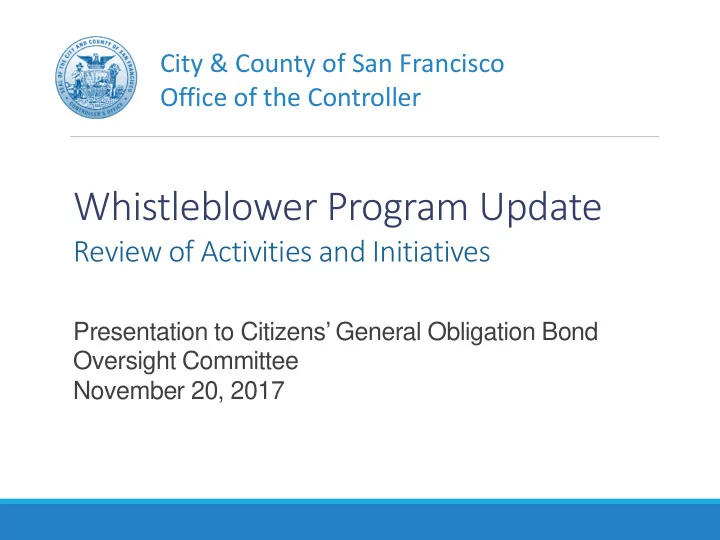

City & County of San Francisco Office of the Controller Whistleblower Program Update Review of Activities and Initiatives Presentation to Citizens’ General Obligation Bond Oversight Committee November 20, 2017
Whistleblower Program Authority The authority for Whistleblower Program investigations is derived from state and city law: ◦ California Government Code, Section 53087.6 ◦ San Francisco Charter, Appendix F ◦ San Francisco Campaign and Governmental Conduct Code, Article IV 2
Matters Appropriate for Investigation The Whistleblower Program shall investigate or otherwise attempt to resolve complaints concerning: ◦ Misuse of city funds ◦ Improper activities by city officers and employees ◦ Deficiencies in the quality and delivery of government services ◦ Wasteful and inefficient government practices 3
Referral of Certain Complaints The Whistleblower Program shall refer complaints that: ◦ Another city department is required by federal, state, or local law to adjudicate ◦ May be resolved through a grievance mechanism established by bargaining unit or contract ◦ Involve violations of criminal law ◦ Are subject to an existing investigation ◦ Allege violations of governmental ethics laws 4
Whistleblower Program Importance and Benefits A fraud hotline is a critical internal control that is often noted as an operating and credit-rating strength when well- implemented by a municipality The Whistleblower Program allows complaints to be submitted anonymously and confidentially Whistleblower Program investigations: ◦ Stop improper conduct and prevent further violations ◦ Reveal relevant facts so that management can make a fully informed decision on how best to proceed 5
Complaints Received By Quarter July 2012-September 2017 450 415 400 90 350 325 316 291 292 300 94 101 95 250 77 89 200 68 75 72 128 79 150 73 72 63 100 51 121 50 103 79 80 77 73 0 FY12-13 FY13-14 FY14-15 FY15-16 FY16-17 FY17-18 Q1 Q2 Q3 Q4 6
Complaint Volume Trend Analysis Merged Referred to Outside of Closed Information Investigated with Department with Whistleblower Without Requested and Total and Closed Previous Charter Jurisdiction Program Jurisdiction Investigation Provided Complaint FY 14-15 69% 6% 7% 7% 11% 1% 100% FY 15-16 72% 10% 3% 8% 7% 0% 100% FY 16-17 63% 10% 2% 10% 15% 0% 100% FY 17-18* 53% 22% 5% 7% 12% 1% 100% * Year-to-date 7
Complaint Activity Fiscal Year 2017-18 Through Quarter 1 • Complaints Open at July 1, 2017 54 • Complaints Received in Quarter 1 121 • Complaints Closed in Quarter 1 112 • Complaints Open at September 30, 2017 63 8
Age of Complaints Closed Fiscal Year 2017-18 Through Quarter 1 70 65 60 50 40 29 30 20 14 10 2 1 1 0 Less Than 30 Days 31-90 Days 91-180 Days 181-270 Days 271-360 Days More Than 360 Days 9
Age of 63 Complaints Open At September 30, 2017 35 31 30 25 20 18 15 10 7 4 5 2 1 0 30 Days or Less 31-90 Days 91-180 Days 181-270 Days 271-360 Days More Than 360 Days 10
Initiatives Fiscal Year 2017-18 To ensure that department investigations are impartial and prompt, the Whistleblower Program hosted department liaison training on November 14, 2017. This training focused on complaints referred to departments for investigation and response, and covered a variety of topics, including: ◦ Selecting a department investigator ◦ Investigation scope and objectives ◦ Evidence ◦ Guidelines for reporting back to the Whistleblower Program The next liaison training will occur in Spring 2018. 11
Initiatives Fiscal Year 2017-18 The Whistleblower Program published bulletins to make employees aware of the red flags associated with insider threats and grant misuse: 12
Initiatives Fiscal Year 2017-18 The Whistleblower Program hosted The Importance of Property & Evidence Management , presented by Maricopa County, Arizona on September 29, 2017. The next webinar, Starting an Investigations Unit , is scheduled for December 2017, and will be presented by Atlanta, Georgia. 13
Recommend
More recommend